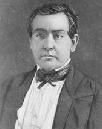Thomas Corwin (1794-1865)
Thomas Corwin was born in Bourbon county, Kentucky, 29 July, 1794, and died in Washington, District of Columbia, 18 December, 1865. In 1798 his father, Matthias, removed to what is now Lebanon, Ohio, and for many years represented his district in the legislature. The son worked on the home farm until he was about twenty years old, and enjoyed very slender educational' advantages, but began the study of law in 1815, and was admitted to the bar in May 1818. His ability and eloquence as an advocate soon gained him an extensive practice.
 Corwin was first chosen to the legislature of Ohio in 1822, serving seven years, and was chosen to congress in 1830, from the Miami district as a Whig, of which party he was an enthusiastic member. His wit and eloquence made him a prominent member of the House of Representatives, to which he was re-elected by the strong Whig constituency that he represented for each successive term till 1840, when he resigned to become the Whig candidate for governor of Ohio, and canvassed the state with General Harrison, addressing large gatherings in most of the counties. He was unsurpassed as an orator on the political platform or before a jury. At the election he was chosen by 16,000 majority, General Harrison receiving over 23,000 in the presidential election that soon followed. Two years later, Governor Corwin was defeated for governor by Wilson Shannon, whom he had so heavily beaten in 1840.
Corwin was first chosen to the legislature of Ohio in 1822, serving seven years, and was chosen to congress in 1830, from the Miami district as a Whig, of which party he was an enthusiastic member. His wit and eloquence made him a prominent member of the House of Representatives, to which he was re-elected by the strong Whig constituency that he represented for each successive term till 1840, when he resigned to become the Whig candidate for governor of Ohio, and canvassed the state with General Harrison, addressing large gatherings in most of the counties. He was unsurpassed as an orator on the political platform or before a jury. At the election he was chosen by 16,000 majority, General Harrison receiving over 23,000 in the presidential election that soon followed. Two years later, Governor Corwin was defeated for governor by Wilson Shannon, whom he had so heavily beaten in 1840.
In 1844 the Whigs again carried the state, giving its electoral vote to Mr. Clay, and sending Mr. Corwin to the United States Senate, where he made in 1847 a notable speech against the war in Mexico. He served in the Senate until Mr. Fillmore's accession to the presidency in July, 1850, when he was called to the head of the Treasury.After the expiration of Mr. Fillmore's term he returned to private life and the practice of law at Lebanon, Ohio.
In 1858 he was returned once more a representative in congress by an overwhelming majority, and was re-elected with but slight opposition in 1860. On Mr. Lincoln's accession to the presidency he was appointed minister to Mexico, where he remained until the arrival of Maximilian, when he came home on leave of absence, and did not return, remaining in Washington and practicing law, but taking a warm interest in public affairs, and earnestly co-operating in every effort to restore peace.
His style of oratory was captivating, and his genial and kindly nature made him a universal favorite. His intemperate speech against the Mexican war hindered his further political advancement. He was a faithful public servant, led a busy life, lived frugally, and, although he had been secretary of the United States treasury, failed to secure a competency for his family.
 Corwin was first chosen to the legislature of Ohio in 1822, serving seven years, and was chosen to congress in 1830, from the Miami district as a Whig, of which party he was an enthusiastic member. His wit and eloquence made him a prominent member of the House of Representatives, to which he was re-elected by the strong Whig constituency that he represented for each successive term till 1840, when he resigned to become the Whig candidate for governor of Ohio, and canvassed the state with General Harrison, addressing large gatherings in most of the counties. He was unsurpassed as an orator on the political platform or before a jury. At the election he was chosen by 16,000 majority, General Harrison receiving over 23,000 in the presidential election that soon followed. Two years later, Governor Corwin was defeated for governor by Wilson Shannon, whom he had so heavily beaten in 1840.
Corwin was first chosen to the legislature of Ohio in 1822, serving seven years, and was chosen to congress in 1830, from the Miami district as a Whig, of which party he was an enthusiastic member. His wit and eloquence made him a prominent member of the House of Representatives, to which he was re-elected by the strong Whig constituency that he represented for each successive term till 1840, when he resigned to become the Whig candidate for governor of Ohio, and canvassed the state with General Harrison, addressing large gatherings in most of the counties. He was unsurpassed as an orator on the political platform or before a jury. At the election he was chosen by 16,000 majority, General Harrison receiving over 23,000 in the presidential election that soon followed. Two years later, Governor Corwin was defeated for governor by Wilson Shannon, whom he had so heavily beaten in 1840.